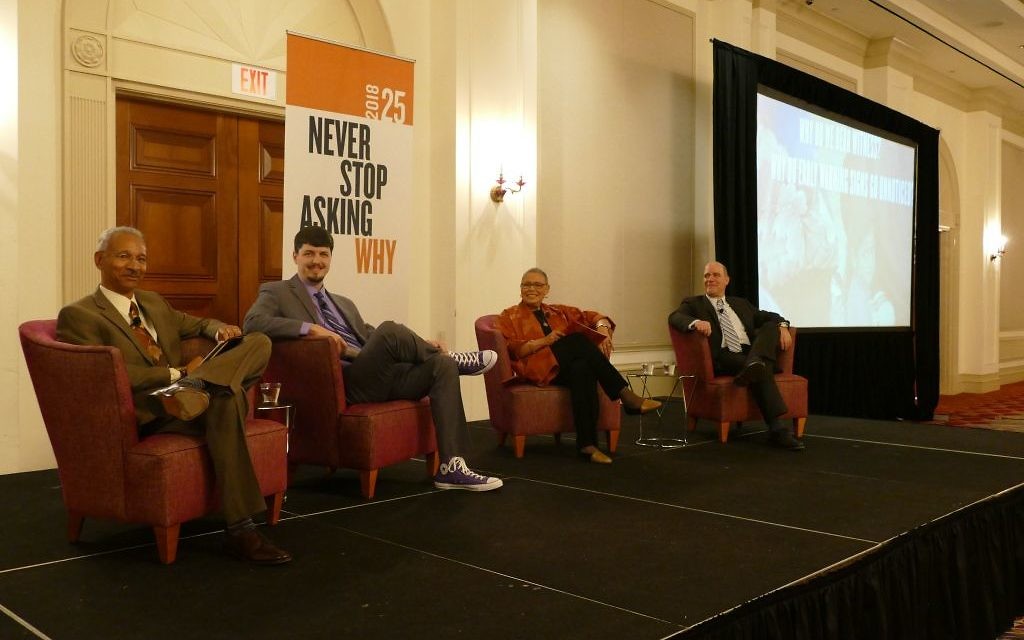Headlines Capture What Georgians Knew During WWII
U.S. Holocaust Memorial Museum's program offers insight about coverage of the Holocaust in 1930's and 40's.

As Hitler’s power spread throughout Europe in the late 1930s and early 1940s, Americans began to receive accounts of Nazi brutality through national and local newspapers.
But even after Kristallnacht, which made front-page news in The Southern Israelite and other newspapers, the words weren’t enough to convince Americans that policies needed to change. A poll in 1938 found that 94 percent of Americans disapproved of Germany’s treatment of Jews, but 72 percent didn’t want Jewish refugees from Germany to make their way to the United States.
“There is something real about seeing, hearing, believing … but no one could really quite believe what they were fighting against until they saw it, and so for most Americans, even though the information was there, they didn’t know about the Final Solution until the spring and summer of 1945,” David Klevan, an educational outreach specialist for the U.S. Holocaust Memorial Museum, said during a museum-sponsored program Wednesday, Nov. 1, at The Temple to discuss “Americans and the Nazi Threat: What did Georgians Know?”
Get The AJT Newsletter by email and never miss our top stories Free Sign Up
Joining Klevan in the discussion were Alexis Scott, the publisher emerita of the Atlanta Daily World; Derrick Angermeier, a doctoral candidate at the University of Georgia; and moderator John Morrow Jr., a UGA history professor.
“We should never stop asking why,” said Robert Tanen, the Southeast director for the U.S. Holocaust Museum. “Yes, we know it, have studied it, have read about it and teach others about it and preserve it. … But it is our duty to always ask why.”

While the U.S. media provided vivid accounts of World War II, most Americans focused on headlines about local problems until the United States entered the war in December 1941.
Klevan said most citizens were still recovering from the Great Depression and were divided about immigration, racism and foreigners. World War I was still fresh in people’s minds, and most Americans did not wish to get involved in another war.
Jim Crow laws were in full effect in Atlanta, which Scott said resulted in the creation of businesses and institutions for and by blacks, such as Spellman College, Morris Brown College and the Atlanta Daily World, founded by her grandfather.
Meanwhile, Angermeier said, Georgians in rural areas were wary of New Deal laws.
Still, news of Hitler and the Nazis caught Americans’ attention as a threat to democracy. “People were concerned,” Klevan said, “particularly Jewish groups and organizations, which demanded that something be done.”
As events from World War II unfolded in publications across America, the Daily World put the international news in the racial context of the South.
“There were a lot of stories about the treatment of Jews in Germany and lynching in the South, which provided an opening to discuss the injustice in both worlds,” Scott said.
In Atlanta, publications continued to cover the atrocities which transpired across Europe which, according to Scott, paved the way for Jews who escaped to find employment at historically black colleges like Morris Brown and Morehouse.
Klevan added that professors generally had an easier time finding employment because of a high demand for academics.
Students also advocated the acceptance of Jewish refugees on college campuses, Angermeier said, although there was a difference between Atlanta and the rest of the state. Because of the “racial caste system in Georgia,” people criticized dictatorship and totalitarianism rather than anti-Semitism and racial hatred.
America’s entrance into the war didn’t increase support for accepting Jewish refugees or change racial attitudes, said Klevan who noted that former Gov. Herman Talmadge kept track of the number of white and black men drafted.
“Even as the war is going on, the publications aren’t so much focused on covering it as they are the individuals who were sent over,” Klevan said.
By late November 1942, however, Americans’ worst fears became a reality after a telegraph intercepted by the State Department confirmed the deaths of 2 million Jews as part of the Final Solution. But while that was front-page news for some publications, Klevan said it was on Page 20 in the Atlanta Journal, next to the help-wanted ads.

“There was no cable news, there was no 24-hour news cycle, and there certainly weren’t many images circulating,” he said. “You could read these things in the paper, but … even if you read it in an article, it was only for that day. It wasn’t there the next day, and there were no photos attached to it.”
By that time the Daily World also had shifted its coverage from what was happening to the Jews to the soldiers themselves, but Scott recounted her father’s memories of the liberation of Buchenwald while he served as his unit’s photographer.
“He could hardly believe it … and was told that the Nazis had tried to kill 30,000 people in two weeks before they got there,” Scott said.
“Never again is a responsibility for all of us,” said Sally Levine, the executive director of the Georgia Commission on the Holocaust. “Memory is not enough.”




comments